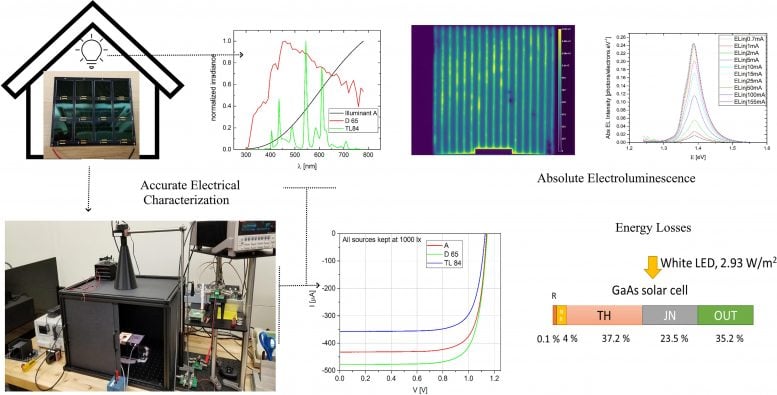
Determining photovoltaic cells’ performance under artificial lighting. Credit: Hamadani
Better methods for assessing solar cells under indoor ambient lighting can help improve their design.
As photovoltaic (PV) technology continues to progress, PV devices’ applications in harvesting energy from indoor ambient light have become more realistic.
During the AIP Publishing Horizons — Energy Storage and Conversion virtual conference, which will be held August 4-6, 2021, Behrang Hamadani, from the National Institute of Standards and Technology, will discuss methods for determining PV cells’ performance under artificial lighting. The presentation, “Measuring and understanding PV performance under ambient lighting,” will be available during the three-day conference.
Depending on the material the PV cell is composed of and the type of artificial light, such as an LED or a fluorescent light source, the effectiveness of the technology can vary greatly. Though the amount of electricity generated by PV cells indoors is often quite low, it is often sufficient for some low-power everyday devices, such as sensors or rechargeable batteries.
However, some combinations of PV material and light source — for example, a gallium indium phosphide PV cell under a warm white LED light — can be even more efficient in converting power than the same material under solar illumination. A better understanding of these relationships is needed to fully characterize the behavior of solar cells under very low illumination conditions.
“Since this area of PV testing and characterization is relatively new, there are currently no universal standards for accurate measurement of electrical performance of these PV devices under different types of artificial light,” said Hamadani. “Therefore, there is a growing need to come up with accurate methods of measuring the performance of solar cells under indoor artificial lighting and adopt new universal standards.”
Hamadani’s presentation will demonstrate how to accurately determine the power conversion efficiency of PV cells under indoor ambient lighting and discuss how energy is balanced within a solar cell in these conditions. He hopes his team’s method can help PV technologies further evolve.
“If people are able to perform more reliable and repeatable measurements of their devices, they’ll be in a better position to incrementally improve the material properties and make progress in increasing the cell efficiency,” he said.